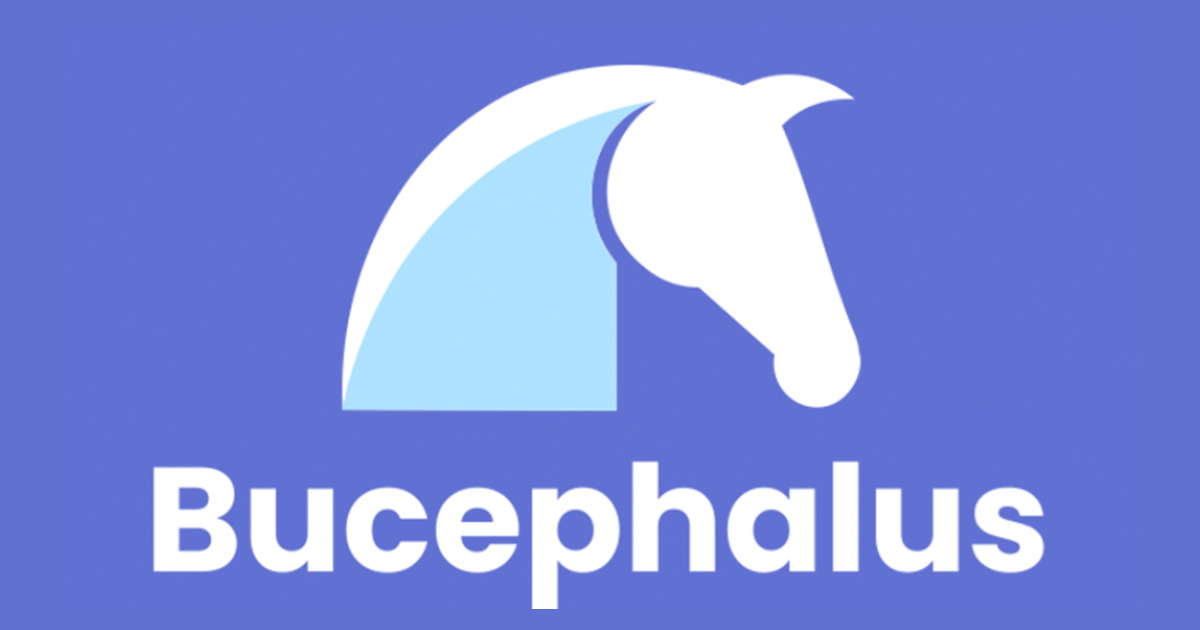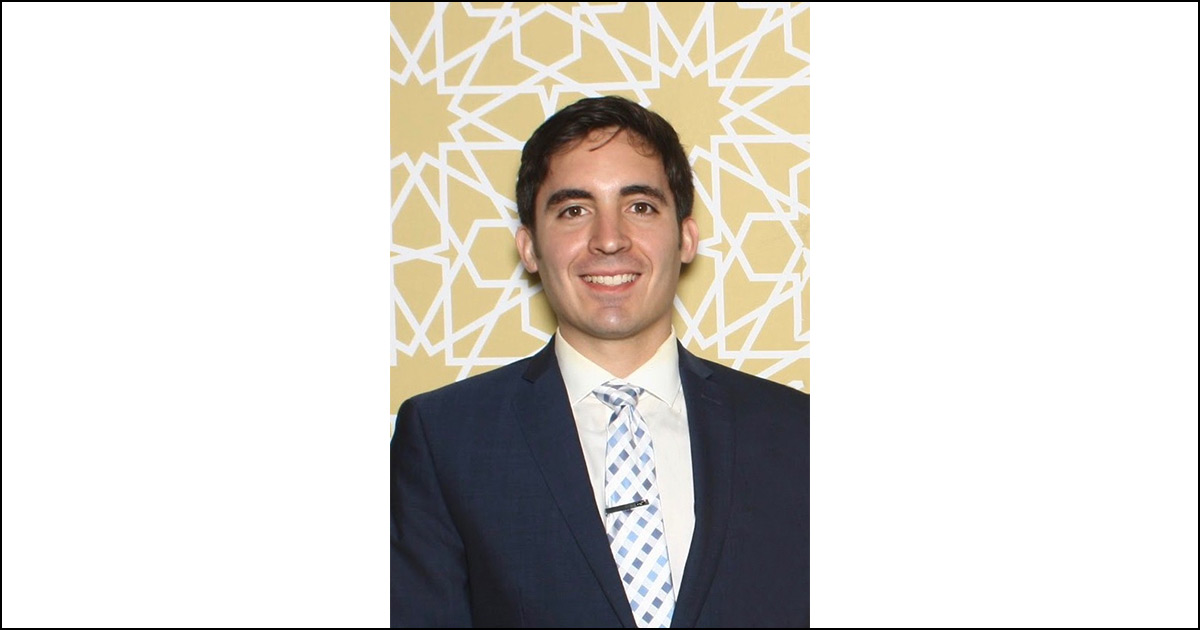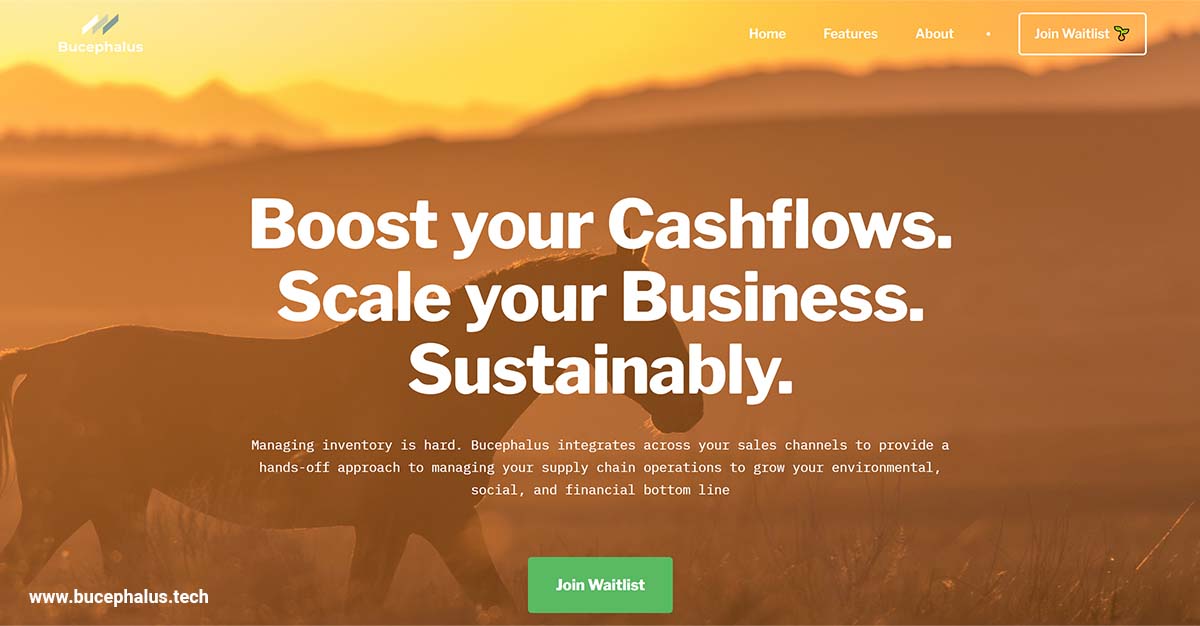Bucephalus Profile

Last Updated: By TRUiC Team
Bucephalus is an inventory and supply chain management tool powered by AI. Businesses gain insight into their cash flows, inventories, and even their environmental impact all on one useful platform.
Interview With Nicholas DeGiacomo
Describe your product or service:
“We are building an AI-powered supply chain and inventory management tool that gives businesses more visibility into their cash flows, inventories, and carbon footprint, on a single unified platform. By providing customers with forecasts on their sales, our platform will recommend quantities and timelines for purchase orders, saving them both time and money.
Our product also provides insights on environmental impact by reporting CO2 emissions in their existing supply chain and directly reduces these emissions by finding more efficient suppliers and providers. In addition, Bucephalus can negotiate bulk deals for sustainable materials and shipping, encourage suppliers and providers toward sustainable processes, and support local manufacturers.
Bucephalus democratizes the backend of commerce for small- and medium-sized businesses and gives the experience of having a team of scientists and MBAs planning customers' supply chain through an easy-to-use B2B SaaS tool.”
Describe your company values and mission:
“The $4 trillion US retail industry is powered by a complex web of global supply chains that are difficult to navigate and leave us collectively blind to the carbon footprint products leave. Over 90% of new retailers and DTC brands close their doors in the first two years of operation. We want to change that. Bucephalus utilizes billions of data points that are generated every day to empower our customers. Bucephalus partners with customers to manage risk in a changing climate to grow their triple bottom line.
Bucephalus is driven by the belief that consumers shouldn’t have to bear the responsibility of protecting the environment while purchasing the products they want. Likewise, businesses shouldn’t need to sacrifice profit for sustainability. Our goal is to twofold: increase the likelihood for a brand to survive while reducing its per-unit greenhouse gas emission of consumer products by 50% in the next decade.”
How are you funded? I.e. venture capital, angel investors, etc.
“Self-funded.”
How big is your team? Tell us a little about them (I.e. co-founders, freelancers, etc.)
“One founder, three part-time, 15-person internship network through partnership with Columbia University's Engineering School coursework. Our CEO brings with him experience working on Amazon’s supply chain team, Mike Bloomberg’s 2020 Presidential campaign, and at NYC-based and VC-backed startups like YouNow. Additionally, he teaches applied statistics at Columbia University and Yeshiva University. While an expert in supply chain and AI, he is also deeply passionate about helping small and medium businesses become more efficient and sustainable.”
Did you always want to start your own business? What made you want to become an entrepreneur?
“Growing up, I used to wake up before sunrise to work with my father. We’d set up awnings, signage, and building lettering for small- and medium-sized businesses across the tri-state area. This experience planted the seeds of entrepreneurship within me from a young age, and I felt encouraged to explore startups following graduate school. Working at startups within the NY ecosystem allowed me to push past my limit continuously and surrounded me with many ambitious people.
That said, my desire to start a company myself came during 2020. Like many people, the lockdowns were a time of self-reflection. I was ready to leave Amazon and wanted to make an impact. While looking around for the best use of my deep knowledge and experience, I saw climate change accelerating and supply chains collapsing. If I was to work on anything else, I decided I would just be wasting my time.”
How did you come up with your startup idea? How did you decide to actually act on the idea? What gave you confidence that you were on the right track?
“In early 2020, I took a sabbatical from Amazon's Supply Chain Optimization Technologies team to work on Mike Bloomberg's Presidential Campaign within data operations and strategy. Then COVID struck, and I went back to Amazon to work on crisis response efforts within our supply chain.
It took us at Amazon — the most sophisticated supply chain operation in the world — a month before we were able to fully adapt. That's when I realized that if even Amazon wrestled with this, other companies had little chance of making it through. As the world continues to warm, extreme weather is only more likely, and that will make supply chain disruptions even more common. That's why I started Bucephalus: to help the little guy -- those SMB owners like my father -- and give them a fighting chance.
Before founding Bucephalus, I started my own Amazon FBA store to learn more about my customers’ experience and their challenges — it’s hard without data. I performed over 100 customer discovery interviews with people who worked within DTC brands or had their own e-commerce stores. One of the most encouraging signs for me was that, when I brought my first round of mock-ups and presented it to a customer, they turned to me and asked, "When are you ready? Can I sign up today?" That’s when I decided to drive forward with building Bucephalus.
Bucephalus has given me and the rest of the team both purpose and platform to make a real impact on the world.”
How did you come up with your company name? Did you have other names you considered?
“Coming from the Greek word for ox head, Bucephalus was a branding mark placed on animals as a mark of trade. It was also the name of Alexander the Great’s horse. Originally thought to be untamable, Alexander calmed the Thessalian steed during a wager and rode Bucephalus over 20,000 miles from Greece to India, at the front of every major battle to build his empire.
Many SMB retailers and DTC brands see their supply chain operations as equally untamable — a gordian knot of complexity. They need Bucephalus to build an empire of their own.”
Feeling inspired? Learn how to launch your company with our guide on how to start a startup.
What is the greatest challenge you faced in starting your business, and how did you overcome it?
“Starting Bucephalus has been a crash course in learning to be shameless in asking others for feedback and help. Building a startup requires a village. Whether it’s answering questions, making introductions to customers, or simply asking someone to review a few words on a website, I’ve benefited greatly by surrounding myself with great people who want to help. I’m particularly proud of Bucephalus’ partnership with Columbia University for space out of the Columbia Startup Lab (CSL) and for collaborations with the Engineering department to serve as a class project to provide learning opportunities for graduate students to gain experience applying AI and running a startup.”
Who is your product or service made for? Who is your target market?
“Bucephalus is made for the entrepreneur of any background who believes they have a kick-ass product and won’t let anyone tell them otherwise. Bucephalus is for those who believe that sustainability is an asset and not an obstacle to overcome. Bucephalus is made for those who want to spend more time focused on their customer, product, and brand, rather than worrying about the latest supply chain disruption that is going to impact them or spending all day in a spreadsheet.
Bucephalus is currently industry agnostic but focused on a chronically underserved segment of the ecommerce market: businesses making under $10 million a month in revenue. Bucephalus wants to be with digitally native DTC brands, ecommerce sellers, or local brick and mortar retailers from day one to partner with their growth. They use Shopify or Amazon FBA to reach their consumers. Our customers probably have a handful of employees, are interested in increasing or maintaining their growth, and want to make their lives easier. They’re capital constrained, they want to hire more if they only could — but talent is hard to come by and expensive.”
What's your marketing strategy?
“Our marketing strategy is our product. Bucephalus hasn’t spent any capital on marketing or advertising yet. Instead, we’re laser-focused on talking to our customers and building the best product possible to meet their needs. I start off each day asking, “Can I get customers to use the product just a few more minutes today because it’s just that valuable?”
Most supply chain providers are not product people. Some people can find it boring. I find it thrilling. It’s a very complicated industry with seemingly infinite edge cases. To speak to the broader market, we need to humanize ourselves, the industry, and speak the language of our customers.”
How did you acquire your first 100 customers?
“We are running in a closed invite-only beta. Our customers have so far come from local NYC-based entrepreneurs of all backgrounds who want a helping hand and someone who has their back. They are friends of friends or in the same slack group as our team members. Once we prove through this experiment that we have solved their pain points, we will pour gas on the fire and grow rapidly from there.”
What are the key customer metrics / unit economics / KPIs you pay attention to to monitor the health of your business?
“I am most interested in the metrics that support our mission: how much are we increasing the profits and cash flows of our customers, and how much CO2 are we reducing?
In addition, we are a B2B SaaS company, so many metrics are your standard SaaS KPIs. I also pay special attention to the number of SKUs we process, [the] accuracy of our forecasts, time to onboarding, and usage. We are actively working on incorporating carbon costs into our systems and are forming partnerships with other entities outside of our customers to get that data.”
What's your favorite book on entrepreneurship?
“I enjoyed reading ‘What You Do Is Who You Are’ by Ben Horowitz.”
What is your favorite startup or business podcast?
“I don't consume startup or business podcasts. I enjoy reading the Weekly Planet by the Atlantic.”
What is something that surprised you about entrepreneurship?
“How supportive most entrepreneurs are and how much people want to help.”
How do you achieve work/life balance as a founder?
“You need to have other passions. I love to box, and I run regularly. External stimuli like training for the 2021 NYC marathon is an effective forcing function.”
How do you stay motivated?
“How can I not be? Bucephalus is solving big problems with big solutions. I’m a competitive person, so the ambition alone is stirring. If I had to break it down, though, I would put it into three categories:
The mission: We need to do something about climate change. I feel this is the best way that my skills can be applied to make a difference at this time.
The problem space: supply chains are enormously complex. It is a gigantic puzzle and delayed rewards and interacting system dynamics. I think Jeff Bezos said that supply chain and logistics are probably [some] of the most intellectually stimulating problem spaces there are, and I agree with him.
The team: Bucephalus has a lot of great people who believe in the mission are doing the best they can to help. That alone keeps me motivated.”
Did you have to develop any habits that helped lead you to success? If so, what are they?
“Talk last, engage the team, ask for problems, not solutions, and do my best to learn something new every day.”
What are you most proud of as an entrepreneur?
“The team we've built and the progress we've made so far.”
Recommended:
- Keep up with more startup companies by visiting our list of the top startups to watch.
- Hear startup stories from real founders on the Startup Savants podcast.
- Form your own startup by reading our review of the best online incorporation services.
Tell Us Your Startup Story
Are you a startup founder and want to share your entrepreneurial journey withh our readers? Click below to contact us today!
More on Bucephalus

Insights From the Founder of AI Startup Bucephalus
We were fortunate enough to hear some valuable insights during our interview with Nicholas DeGiacomo of Bucephalus that will inspire, motivate, and teach aspiring and established entrepreneurs alike.

5 Ways to Support AI Startup Bucephalus
We asked Nicholas DeGiacomo, founder of Bucephalus, to share the most impactful ways to support their startup, and this is what they had to say.


